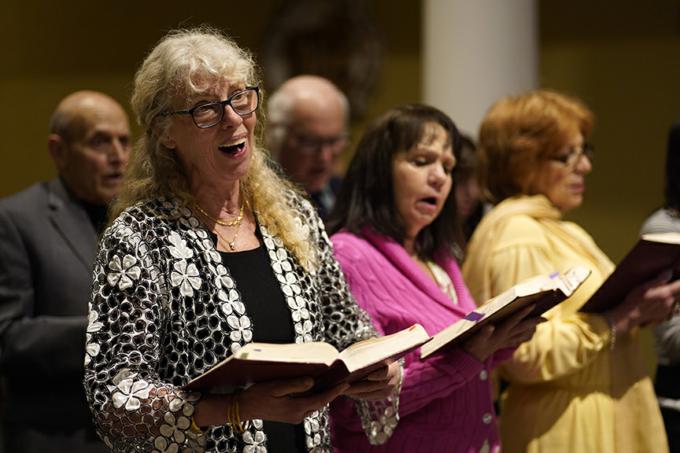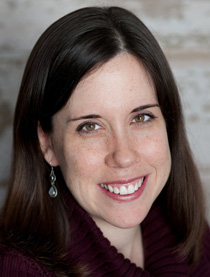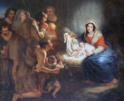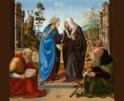
Culture
It's a foretaste of heaven to look around Mass and witness the full participation of the people of God.

Fanucci
The first thing I noticed about our parish was the music. Everyone sang.
From the moment the opening hymn began, the sanctuary was filled with a robust chorus. I looked around and couldn't believe my eyes (or ears) -- adults, children, women and men were all singing at full voice.
I grew up in a typical Catholic church where the congregation mostly listened to the choir or cantor, so I came to assume the same whenever I'd visit a new parish. You might find beautiful instrumental music or an exceptional choir, but rarely would the people in the pews respond with more than a mumbling "Amen."
But now our parish has changed my mind.
It's a foretaste of heaven to look around Mass and witness the full participation of the people of God. Turns out, the wider Church agrees. In the Constitution on the Sacred Liturgy issued by the Second Vatican Council, we find robust encouragement for active participation: "Religious singing by the people is to be intelligently fostered so that in devotions and sacred exercises, as also during liturgical services, the voices of the faithful may ring out according to the norms and requirements of the rubrics" (Sacrosanctum Concilium, 118).
What's more, this vocal participation in the liturgy becomes a means for grace: "And the people reply to God both by song and prayer ... when the Church prays or sings or acts, the faith of those taking part is nourished and their minds are raised to God, so that they may offer Him their rational service and more abundantly receive his grace" (Sacrosanctum Concilium, 33).
All this makes me wonder: are we teaching younger generations of Catholics how to sing?
Few sports fans would refuse to stand and sing for the national anthem or "Take Me Out To The Ball Game." Many drivers belt out their favorite tunes on the radio in the car. But do we bring the same enthusiastic participation to Mass?
Of course, context matters. Worship is meant to be reverent, not raucous. But full and active participation in the liturgy means not just silent respect but singing, too. The cantor or choir are meant to be the leaders we follow, not the soloists we watch. We are not spectators but participants in these sacred mysteries.
My high school choir director often quoted St. Augustine that "singing is praying twice." Sacred song sinks into our bones, giving God glory. We don't need to be professional singers or have perfect pitch, only to raise our voices in praise and thanksgiving together.
If your own singing has lagged as an adult, what a perfect practice to add to your Lenten observance: singing more at Mass. Remember that your children, grandchildren and all young people in the pews are watching. What are we teaching children by the way we sing?
You might start by singing more at home. Growing up, my family added a sung grace after the traditional "Bless us, O Lord" prayer. Today my own family sings a short hymn before dinner to match the liturgical season. Each night I get to hear voices, old and young, warble "Lord, Who Throughout These 40 Days" and remember how Christ came for all of us, from toddlers to teenagers to tired adults -- and everyone in between.
Music makes us human. From the first rhythms of our mother's heartbeat in the womb, we grow attuned to the world through song: lullabies, childhood ABCs, birthday celebrations, and holiday favorites. But if we stop singing in worship -- out of insecurity, boredom, habit or sheer laziness -- we miss what full participation in the liturgy means: the grace it brings us and the glory it gives to God.
In its ancient roots, the word "enthusiasm" means to be inspired or inhabited by God. This Lent, let us bring our enthusiasm to Mass and pray together in song, that we might all be filled with God's Holy Spirit, from generation to generation.
- Laura Kelly Fanucci is a writer, speaker and author of several books, including "Everyday Sacrament: The Messy Grace of Parenting." Her work can be found at laurakellyfanucci.com.
Recent articles in the Culture & Events section
-
Happy New Year!Eileen McLaughlin
-
Joyful hopeMichael Reardon
-
Scripture Reflection for Jan. 5, 2025, The Epiphany of the LordDeacon Greg Kandra
-
Tolkien's world, still popular on the big screen, began with faith and wordsCecilia Hadley
-
Scripture Reflection for Dec. 22, 2024, Fourth Sunday of AdventDeacon Greg Kandra























